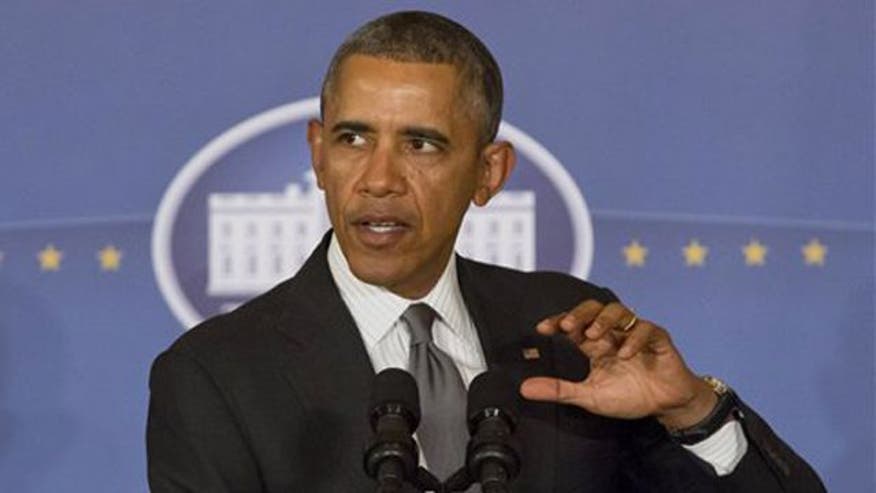
No one should be surprised by the shriveled Defense Department budget request the Obama administration released Monday. Shrinking our military to basic impotence has been on the Obama agenda since he took office – and on the New Left political wish list long before that.
We were already on track for a Navy smaller than it was before World War I, an Army smaller than in 1940, and an Air Force smaller than it’s been since World War II and acquiring fewer new aircraft than when it was buying from the Wright brothers back in 1915. Not to mention a weapons system acquisition, research and development budget – in other words, the future of our military – that would sink by as much as 38 percent.
What makes these cuts so different and so dangerous is that they go after force structure instead of just continuing to shrink our defense industrial base and numbers of available weapons systems – although there’s plenty of that too (like eliminating the A10 Thunderbolt ground attack plane, the only twin-engine fixed-frame aircraft the Army has for combating enemy tanks and vehicles from the air).
It isn’t simply the era of American military dominance this Obama budget puts at risk; it’s America’s ability to defend its interests around the globe.
For example, we’re now slated to see the Army reduce itself from its current level of 520,000 to 440-450,000 troops. That’s a force that’s demonstrably too small to handle any war larger than Iraq, which – despite its years of headlines and heartbreak – was actually a fairly small, guerrilla-type conflict compared to, say, a head-on collision with China in the Pacific or with Iran in the Persian Gulf, or even with a nuclear-armed, ballistic missile-equipped North Korea on the Korean peninsula.
Our current military barely made it through Iraq without “breaking the force,” as the jargon has it. What will be the result if we have to deal with a major theater conflict that’s even larger, and demands the maximum from our Army, Air Force, Navy and Marines simultaneously?
Besides, armed conflicts for the United States have historically come in twos, not one at a time: think Europe and the Pacific in World War II, and Iraq and Afghanistan more recently.
It isn’t simply the era of American military dominance this Obama budget puts at risk; it’s America’s ability to defend its interests around the globe when future opponents know we lack the means to deal with two major crises at the same time.
Some say the severity of these cuts will be lessened because the recent Ryan-Murray budget deal suspends automatic sequestration of DoD funds. But that deal suspends them only in fiscal 2014 and 2015. After that, they start up again, and so will the drain on money for training, maintenance and support of the forces we do have left.
Some say this Obama budget is just a ploy, a bargaining chip to scare Republicans into going along with more tax increases or to lift automatic sequestration. If that’s true, then the decision of the Joint Chiefs of Staff to go along with these cuts is even more inexplicable – and shameful.
Finally, some will say this means we just have to learn to avoid conflicts that require large numbers of boots on the ground and stick to the ones we can resolve with a Navy SEALs team or two and a couple of Hellfire missile-wielding Predators.
The fact is, we don’t choose wars – the myth of Iraq as a “war of choice” notwithstanding.
They choose us. As the greatest defender and representative of freedom on the planet, we are automatic targets for every thug and authoritarian regime out there, and under Obama they’re feeling bolder and more confident of success than ever.
Now it’s up to Congress to show the backbone the Joint Chiefs of Staff and Pentagon bureaucrats no longer have, and reject these cuts.
It was Douglas MacArthur who warned, “From the dawn of history to the present day, it has always been the militant aggressor taking the place of the unprepared.” This budget moves us closer to being unprepared than we’ve been since Pearl Harbor.
This may be the Pentagon budget for peaceniks, but it’s bound to bring us closer to war somewhere in the world – and bring us as close as we’ve come since Pearl Harbor to not being able to see it through.
Historian Arthur Herman is a senior fellow at the Hudson Institutein Washington, D.C. He is author of seven books, including New York Times bestseller “How the Scots Invented the Modern World” (2001); the Pulitzer Prize Finalist “Gandhi and Churchill”(2008); “To Rule the Waves: How the British Navy Shaped the Modern World” (nominated for the UK’s Mountbatten Prize); and the highly acclaimed “Freedom’s Forge: How American Business Produced Victory in World War II,” which The Economist magazine picked as one of the Best Books of 2012. His most recent work is “The Cave and the Light: Plato Versus Aristotle, and the Struggle for the Soul of Western Civilization” (Random House 2013). Follow him on Twitter@ArthurLHerman.

